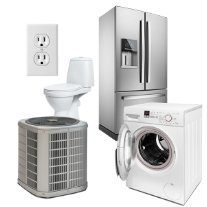How long do home systems and home appliances last?
There are few things more frustrating than having a major home system or home appliance break down, only to find out that the warranty has just run out. When those breakdowns cross paths with surprisingly high repair/replacement bills, frustration turns into agony. While the life span of your home’s systems and appliances can vary based on manufacturers, one thing is certain: One day they will quit working, and addressing these breakdowns will likely be expensive and inconvenient.
Most home appliances only come with a 1-year manufacturer’s warranty. Once that year passes, the burden for repair or replacement often falls to you. Knowing the age of your home systems and home appliances, along with their expected life spans, is an excellent way to hedge against financial risks.
Today, we’re going to help you prepare for the inevitable breakdown of your home’s major systems and appliances. We’ll show you the average life spans and replacement costs of these systems and appliances, give you a few tips to help you determine where your systems and appliances stand in their life spans and explain how 2-10 Home Buyers Warranty (2-10 HBW) can help keep your house humming despite breakdowns.
Typical life spans and costs of home systems and home appliances
Below are the typical life spans and replacement costs for home systems and home appliances, sorted by life span.
| Systems and Appliances | Life Span* | Replacement Cost |
| Dishwasher | 9 years | $660 |
| Washing Machine | 10 years | $740 |
| Water Heater – Tank | 10–11 years | $1,790 |
| Refrigerator | 13 years | $1,250 |
| Dryer | 13 years | $730 |
| Oven/Range | 13–15 years | $1,200–$1,400 |
| Electric Furnace | 15 years | $2,030 |
| HVAC | 15–25 years | $6,400 |
| Gas Furnace | 18 years | $2,030 |
| Water Heater – Tankless | 20 years | $1,790+ |
*Average life data from National Association of Home Builders/Bank of America Home Equity, Study of Life Expectancy of Home Components.
These averages can give you an idea of what to expect from your systems and appliances going forward. To give yourself the best chance of extending the life span of these systems and appliances, you’ll need to keep up with proper maintenance. Here are some tips for how to do that.
Dishwasher
Of the listed home appliances, dishwashers tend to have the shortest life span. You can typically give your dishwasher the best chance of reaching its maximum life span by cleaning its filter regularly and knowing the various ways to address clogs in the dishwasher.
Washing Machine/Dryer
Washers and dryers can last a decade or more with proper maintenance. For washers, check the water hoses regularly to assure that there are no kinks or rips, and don’t overload the washer. For dryers, cleaning out your exhaust vent every year or two can go a long way toward extending the dryer’s life span.
Water Heaters
Tank water heaters, both electric and gas, typically last about a decade with proper maintenance. A good way to maintain a tank water heater is by draining it once a year to prevent sediment buildups.
Tankless water heaters can last up to 20 years. However, to reach that life span, you’ll need to commit to annual descaling, especially if your area uses hard water (i.e., water with lots of minerals). Failing to do so can cause damage to the heat exchanger, which isn’t usually covered by a manufacturer’s warranty.
Refrigerator
On average, you should expect to get 13 years out of your refrigerator. Cleaning your fridge’s condenser coils and checking the door seals regularly will help it run most efficiently.
Oven/Range
As one of the more durable home appliances, you can get 13–15 years out of your oven. Cleaning the oven once or twice a year is an easy way to extend its life span. But be careful when cleaning underneath oven knobs. Many ovens break down because people short out the oven’s electrical system while trying to clean underneath the knobs without removing the knobs.
HVAC
Central heating and air conditioner (HVAC) systems typically last 15–25 years. Proper maintenance, such as changing air filters every 3–6 months and keeping A/C units free of debris, can help extend the life of this expensive-to-replace system.
Furnaces
It’s a good idea to change your furnace filter as it gets dirty, which can range anywhere from 1 month for thinner filters to 1 year for thicker filters. Consider also getting a professional furnace inspection every year to assure that your furnace is running efficiently.
How can you know the age of your home’s systems and appliances?
If you didn’t buy the appliance or install the system yourself, how can you know its age? Here are a few ways to find out.
- Find the appliance’s model number and serial number. Then, enter those numbers into appliance411.com’s Date Code Search to find its age.
- If you are purchasing a home, ask the Seller or the home inspector for ages on systems and appliances. Review the property disclosure statement, too.
- Consider the home’s age. If it’s less than 10–12 years old, then it’s likely that the systems and appliances are no older than that, too.
How 2-10 HBW helps you
Even if you commit to proper maintenance on all systems and appliances, things will still break down, sometimes before you expect it and almost always after the manufacturer’s warranty expires. When something goes wrong with your home, it can be expensive and inconvenient.
That’s why 2-10 HBW provides systems and appliances home warranties for homeowners, which cover the systems and appliances mentioned above against routine wear and tear. It also gives you the peace of mind of knowing that if a system or appliance breaks down before it should or when you least expect it, 2-10 HBW is there to make protecting your home simple and economical.
2-10 HBW offers the most comprehensive home warranty coverage for homeowners. Let us help you protect your home.








